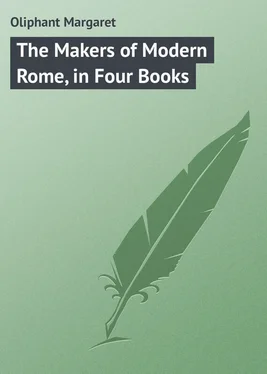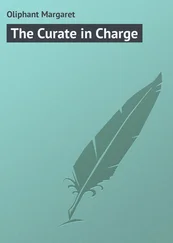Margaret Oliphant - The Makers of Modern Rome, in Four Books
Здесь есть возможность читать онлайн «Margaret Oliphant - The Makers of Modern Rome, in Four Books» — ознакомительный отрывок электронной книги совершенно бесплатно, а после прочтения отрывка купить полную версию. В некоторых случаях можно слушать аудио, скачать через торрент в формате fb2 и присутствует краткое содержание. Жанр: foreign_prose, на английском языке. Описание произведения, (предисловие) а так же отзывы посетителей доступны на портале библиотеки ЛибКат.
- Название:The Makers of Modern Rome, in Four Books
- Автор:
- Жанр:
- Год:неизвестен
- ISBN:нет данных
- Рейтинг книги:5 / 5. Голосов: 1
-
Избранное:Добавить в избранное
- Отзывы:
-
Ваша оценка:
- 100
- 1
- 2
- 3
- 4
- 5
The Makers of Modern Rome, in Four Books: краткое содержание, описание и аннотация
Предлагаем к чтению аннотацию, описание, краткое содержание или предисловие (зависит от того, что написал сам автор книги «The Makers of Modern Rome, in Four Books»). Если вы не нашли необходимую информацию о книге — напишите в комментариях, мы постараемся отыскать её.
The Makers of Modern Rome, in Four Books — читать онлайн ознакомительный отрывок
Ниже представлен текст книги, разбитый по страницам. Система сохранения места последней прочитанной страницы, позволяет с удобством читать онлайн бесплатно книгу «The Makers of Modern Rome, in Four Books», без необходимости каждый раз заново искать на чём Вы остановились. Поставьте закладку, и сможете в любой момент перейти на страницу, на которой закончили чтение.
Интервал:
Закладка:
We come here upon a break in the hitherto redundant story. Melania and Rufinus were in possession of their convents, and fully established as residents on the Mount of Olives, when the other pilgrims arrived; and there can be but little doubt that every grace of hospitality was extended by the one Roman lady to the other, as well as by the old companions of Jerome to her friend. But in the course of the after-years these dear friends quarrelled bitterly, not on personal matters, so far as appears, but on points of doctrine, and fell into such prolonged warfare of angry and stinging words as hurt more than blows. By means of this very intimacy they knew everything that had ever been said or whispered of each other, and in the heat of conflict did not hesitate to use every old insinuation, every suggestion that could hurt or wound. The struggle ran so high that the after-peace of both parties was seriously affected by it; and one of its most significant results was that Jerome, a man great enough and little enough for anything, either in the way of spitefulness or magnanimity, cut off from his letters and annals all mention of this early period of peace, and all reference to Melania, whom he is supposed to have praised so highly in his first state of mind that it became impossible in his second to permit these expressions of amity to be connected with her name. This is a melancholy explanation of the silence which falls over the first period of Paula's residence in Palestine, but it is a very natural one: and both sides were equally guilty. The quarrel happened, however, years after the first visit, which we have every reason to believe was all friendliness and peace.
After this first pause at Jerusalem, the caravanserai got under way again and set out on a long journey through all the scenes of the Old Testament, the storied deserts and ruins of Syria, not much less ancient to the view and much less articulate than now. This was in the year 387, two years after their departure from Rome. Even now, with all our increased facilities for travel – neutralised as they are by the fact that these wild and desert lands will probably never be adapted to modern methods – the journey would be a very long and fatiguing business. Jerome and his party "went everywhere," as we should say; they were daunted by no difficulties. No modern lady in deer-stalker's costume could have shrunk less from any dangerous road than the once fastidious Paula. They stopped everywhere, receiving the ready hospitality of the convents in every awful pass of the rocks and stony waste where such homes of penance were planted. Those wildernesses of ruin, from which our own explorers have picked carefully out some tradition of Gilgal or of Ziklag, some Philistine stronghold or Jewish city of refuge – were surveyed by these adventurers fourteen hundred years ago, when perhaps there was greater freshness of tradition, but none of the aids of science to decipher what would seem even more hoary with age to them than it does to us. How trifling in our pretences at exploration do the luxurious parties of the nineteenth century seem, abstracted from common life for a few months at the most, and with all the resources of civilisation to fall back upon, in comparison with that of these patient wanderers, eating the Arab bread and clotted milk, and such fare as was to be got at, finding shelter among the dark-skinned ascetics of the desert communities, taking refuge in the cave which some saint but a day or two before had inhabited, wandering everywhere, over primeval ruin and recent shrine!
When they came back from these savage wildernesses to green Bethlehem standing up on its hillside over the pleasant fields, the calm and sweetness of the place went to their hearts. It was in this sacred spot that they decided to settle themselves, building their two convents, Jerome's upon the hill near the western gate, Paula's upon the smiling level below. He is said to have sold all that he had, some remains of personal property in Dalmatia belonging to himself and his brother, who was his faithful and constant companion, to provide for the expenses of the building, on his side; and no doubt the abundant wealth of Paula supplemented all that was wanting. Gradually a conventual settlement, such as was the ideal of the time, gathered in this spot. After her own convent was finished Paula built two others near it, which were soon filled with dedicated sisters. And she built a hospice for the reception of travellers, so that, as she said with tender smiles and tears, "If Joseph and Mary should return to Bethlehem, they might be sure of finding room for them in the inn." This soft speech shines like a gleam of tender light upon the little holy city with all its memories, showing us the great lady of old in her gracious kindness, full of noble natural kindness, and seeing in every poor pilgrim who passed that way some semblance of that simple pair, who carried the Light of the World to David's little town among the hills.
All these homes of piety and charity are swept away, and no tradition even of their site is left; but there is one storied chamber that remains full of the warmest interest of all. It is the rocky room, in one of the half caves, half excavations close to that of the Nativity, and communicating with it by rudely hewn stairs and passages, in which Jerome established himself while his convent was building, which he called his Paradise, and which is for ever associated with the great work completed there. All other traditions and memories grow dim in the presence of the great and sacred interest of the place. Yet it will be impossible even there for the spectator who knows their story to stand unmoved in the scene, practically unaltered since their day, where Jerome laboured at his great translation, and Paula and Eustochium copied, compared, and criticised his daily labours. A great part of the Vulgate had been completed in Rome, but since leaving that city Jerome had much increased his knowledge of Hebrew, losing no opportunity, during his travels, of studying the language with every learned Rabbi he encountered, and acquiring much information in respect to the views and readings of the doctors in the law. He took the opportunity of his retirement at Bethlehem to revise what was already done and to finish the work. His two friends had both learned Hebrew in a greater or less degree before leaving Rome. They had no doubt shared his studies on the way. They read with him daily a portion of the Scriptures in the original; and it was at their entreaty and with their help that he began the translation of the Psalms, so deeply appropriate to this scene, in which the voice of the shepherd of Bethlehem could almost be heard, singing as he led his flock about the little hills. I quote from M. Amédée Thierry a sympathetic description of the method of this work as it was carried out in the rocky chamber at Bethlehem, or in the convent close by.
His two friends charged themselves with the task of collecting all the materials, and this edition, prepared by their care, is that which remains in the Church under Jerome's name. We have his own instructions to them for this work, even to the lines traced for greater exactness, and the explanation of the signs which he had adopted in the collation of the different versions with his text, sometimes a line underscored, sometimes an obelisk or asterisk. A comma followed by two points indicated the cutting out of superfluous words coming from some paraphrase of the Septuagint; a star followed by two points showed, on the contrary, where passages had to be inserted from the Hebrew; another mark denoted passages borrowed from the translation of Theodosius, slightly different from the Septuagint as to the simplicity of the language. In reading these various symbols it is pleasant to think of the two noble Roman ladies seated before the vast desk upon which were spread the numerous manuscripts, Greek, Hebrew, and Latin – the Hebrew text of the Bible, the different editions of the Septuagint, the Hexapla of Origen, Theodosius, Symmachus, Aquila, and the Italian Vulgate – whilst they examined and compared, reducing to order under their hands, with piety and joy, that Psalter of St. Jerome which we still sing, at least the greater part of it, in the Latin Church at the present day.
Читать дальшеИнтервал:
Закладка:
Похожие книги на «The Makers of Modern Rome, in Four Books»
Представляем Вашему вниманию похожие книги на «The Makers of Modern Rome, in Four Books» списком для выбора. Мы отобрали схожую по названию и смыслу литературу в надежде предоставить читателям больше вариантов отыскать новые, интересные, ещё непрочитанные произведения.
Обсуждение, отзывы о книге «The Makers of Modern Rome, in Four Books» и просто собственные мнения читателей. Оставьте ваши комментарии, напишите, что Вы думаете о произведении, его смысле или главных героях. Укажите что конкретно понравилось, а что нет, и почему Вы так считаете.












